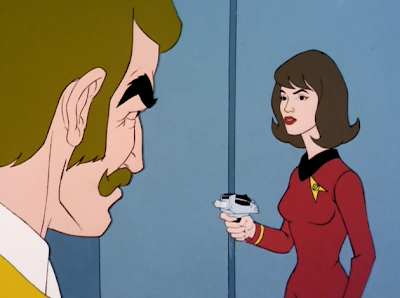Stardate
5143.3: The Enterprise is near the Romulan Neutral Zone when it assists a
damaged one-man vessel. One crew person
is recovered from the ship: the long-missing philanthropist and “living legend,” Carter Winston. Winston has been missing for five years, and
presumed dead, but his fiancé Anne serves aboard the Enterprise as a security
officer. She is thrilled to learn he is
still alive.
Not
long after Carter Winston boards the Enterprise, however, he breaks up with
Anne, and sabotages the ship.
In
truth, he is an alien known as a Vendorian, a shape-shifter who can “re-arrange his molecular structure” and
who practices “deceit as a way of life.” This particular Vendorian is also a
Romulan spy, but by taking on Carter Winston’s form, he has also begun to take
on some of the philanthropist’s emotions and personality…
This
episode of Star Trek: The Animated Series (1973 – 1974) is so good, so
mature in terms of its storyline and characterizations that you almost forget
it is a cartoon. Indeed, this installment looks, feels and
plays like “real” Star Trek.
In
particular, “The Survivor” asks the viewer to reckon with the grown-up idea
that “form isn’t terribly important”
when it comes to love. Today, our
culture is still learning in this idea, in terms of the type of partnerships it
finds acceptable, but as usual, Star Trek – in episodes such as “The
Survivor” and “Metamorphosis” -- proves itself ahead of the curve. Here, Anne (voiced by Nichelle Nichols)
realizes that something of the man she loves survives in the Vendorian, and
decides that she can love him despite his alien origin and nature.
The
alien also arrives at an interesting conclusion about his life. On his world, he says, he was a “non-producer” and “useless.” He undertook espionage
work for the Romulans so he could do “something
of value.” After experiencing human
emotions towards Anne – after knowing
what it means to actually live as a human -- he realizes that producing or
doing something of value may not be as important as honoring love, and
feelings. Again, that’s an incredibly Star
Trek-kian message.
I
should also add, this episode follows up brilliantly on “The Lorelei Signal” by
featuring a female security guard as a central character. Science fiction television, in particular,
has often been slow to allow its female characters to operate outside the traditional
“caretaker” role. But Star
Trek: The Animated Series blazes trails in this regard, noting that
women can function, and function well in dangerous assignments. One could make the argument that this episode
is really about Anne: about her conflict between duty and personal life, and
her decision to love a man who embodies all she misses so deeply in Carter.
“The
Survivor” is such a strong episode in terms of its themes and characters that
the sequence involving the Romulans and their attempt to capture the Enterprise
hardly seems entirely necessary. One
wonders why the Romulans would violate a peace treaty and use a Vendorian when
it is so easy to prove his involvement.
It
also stretches believability, just a bit, that the Vendorian could change
himself into “energy” by becoming a deflector shield. It’s established early in the story that the
being must change to a person or object (like a sick bay table) of relative
size. Is a deflector shield around the Enterprise of relative size?
Beyond
these minor problems, “The Survivor” proves how ably Star Trek: The Animated Series
dramatizes adult stories about important qualities of life. In this episode, an alien hiding in human
form finds that humanity isn’t a disguise, but a way of being. It’s a really good, really original show,
especially after last week’s unnecessary tribble re-hash.













John, very accurate review of this extremely mature Star Trek animated episode "The Survivor". I absolutely agree that this script was equal to a live-action TOS episode. That Winston has been missing for five years, but his fiancé Anne serves aboard the Enterprise is reminiscent of Nurse Chapel in TOS "What Are Little Girls Made Of?".
ReplyDeleteSGB